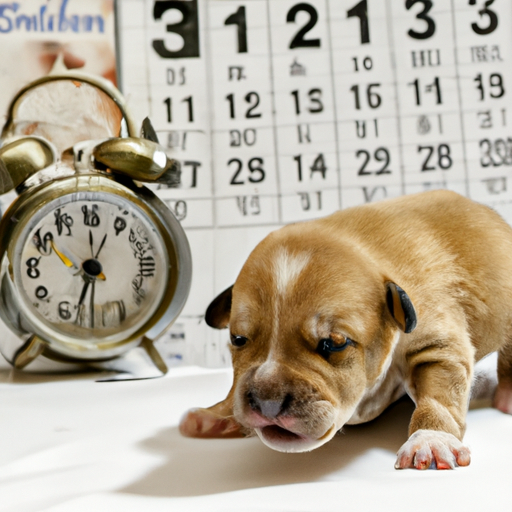As a caregiver, it’s only natural for you to look forward to the milestones your puppies will reach. You might be particularly curious about when they will start walking or when their eyes will open. This article will provide comprehensive insights into these developmental stages and will guide you on how to provide the best care during these times.
Understanding Puppy Development
Puppies undergo a series of developmental stages from birth until they are fully grown. Understanding these phases is essential to providing appropriate care and support during their formative weeks.
- Neonatal period (0-2 weeks): This is the stage immediately after birth. Puppies are born blind and deaf with their eyes and ears sealed shut. They rely on their mother for everything.
- Transitional period (2-4 weeks): This is when major changes begin to occur. Puppies will start to open their eyes, develop their teeth, and start to walk.
- Socialization period (4-12 weeks): Puppies become more aware of their surroundings and start to interact with other dogs and humans.
- Juvenile period (3-6 months): Puppies continue to grow and develop, learning about their world and how to interact with it.
When Do Puppies Open Their Eyes?
Puppies typically start to open their eyes when they are around 10 to 14 days old. However, this can vary between breeds and individual puppies. It’s essential to remember that they won’t have perfect vision immediately. Their sight will still be blurry and they’ll primarily rely on their sense of smell and touch to navigate their world.
Understanding the Process of Eye Opening
When puppies begin to open their eyes, the process is gradual. It often starts with the eyes slightly opening and over a few days, they will fully open.
| Day | Eye Opening Stage |
|---|---|
| Day 1 | Eyes are tightly shut |
| Day 10 | Eyes start to slightly open |
| Day 14 | Eyes are fully open |
Remember, never attempt to force a puppy’s eyes open as this can cause serious harm.
When Do Puppies Start Walking?
Just like with opening their eyes, puppies begin to walk at their own pace. Typically, they start to walk around the same time their eyes open, at about 2 to 3 weeks of age. At first, their movements will be more of a crawl or a wobble rather than confident strides.
Understanding the Process of Learning to Walk
The process of learning to walk is gradual and requires patience:
- Week 2-3: Puppies begin to move around with a wobble or crawl.
- Week 3-4: They start to gain more control over their movements, standing and taking shaky steps.
- Week 4-5: By now, puppies are walking with more confidence and even starting to play and explore.
Caring for Puppies During These Milestones
As a caregiver, your role during these milestones is crucial. Ensure the puppies’ environment is safe for their new explorations. Avoid bright lights in the initial days after their eyes open and keep their surroundings free from harmful objects as they begin to walk.
Troubleshooting Developmental Delays
If puppies do not open their eyes by 2 weeks or start walking by 3 weeks, consult a vet. It could be a sign of developmental delays. Also, monitor their interactions and play. If a puppy seems overly clumsy or bumping into things frequently, they might have vision problems.
Frequently Asked Questions
Q: Can I help my puppy open its eyes or start walking?
A: It’s best to let nature take its course. Trying to force a puppy’s eyes open or making them walk before they’re ready can cause harm.
Q: My puppy’s eyes are open, but they’re not clear. Is this normal?
A: Yes, it’s normal for a puppy’s eyes to be a bit cloudy or blueish when they first open. Their vision will clear up over time.
Q: My puppy is older than 3 weeks and isn’t walking yet. What should I do?
A: It’s best to consult your vet. They can check for any developmental issues or health concerns.
Remember, every puppy develops at their own pace. As a caregiver, your patience, care, and understanding during these milestones will contribute significantly to their healthy growth and development.



